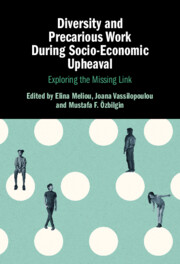Book contents
- Diversity and Precarious Work during Socio-economic Upheaval
- Diversity and Precarious Work during Socio-economic Upheaval
- Copyright page
- Contents
- Figures
- Contributors
- 1 Introduction
- 2 Pandemic Precarities and Gendered Biopolitics within the Neoliberal University
- 3 LGBTQ+ Individuals and Precarious Work
- 4 Age, Gender, and Precarity
- 5 How the (In)Ability of Using One’s Disability Strategically Reinforces Inequality and Precariousness amongst Disabled Workers
- 6 Classed and Gendered Experiences of Precarity in Dirty Work
- 7 Precarity and Diversity
- 8 Precarious Work in the Gig Economy
- 9 Refugees’ Vulnerability towards Precarious Work
- 10 Trapped in Precarious Work
- 11 How Precarity Is Threaded into Migration Rules
- 12 Culture, Precarity, and Dignity
- 13 Transforming Humanitarianism
- 14 Artificial Intelligence, the Gig Economy, and Precarity
- Index
- References
2 - Pandemic Precarities and Gendered Biopolitics within the Neoliberal University
Published online by Cambridge University Press: 01 February 2024
- Diversity and Precarious Work during Socio-economic Upheaval
- Diversity and Precarious Work during Socio-economic Upheaval
- Copyright page
- Contents
- Figures
- Contributors
- 1 Introduction
- 2 Pandemic Precarities and Gendered Biopolitics within the Neoliberal University
- 3 LGBTQ+ Individuals and Precarious Work
- 4 Age, Gender, and Precarity
- 5 How the (In)Ability of Using One’s Disability Strategically Reinforces Inequality and Precariousness amongst Disabled Workers
- 6 Classed and Gendered Experiences of Precarity in Dirty Work
- 7 Precarity and Diversity
- 8 Precarious Work in the Gig Economy
- 9 Refugees’ Vulnerability towards Precarious Work
- 10 Trapped in Precarious Work
- 11 How Precarity Is Threaded into Migration Rules
- 12 Culture, Precarity, and Dignity
- 13 Transforming Humanitarianism
- 14 Artificial Intelligence, the Gig Economy, and Precarity
- Index
- References
Summary
This chapter explores the gendered biopolitics of the COVID-19 pandemic through an analysis of the UK’s marketized higher education sector. Theoretically, we combine feminist political economy with labour market segmentation theory to develop a novel meso-level biopolitical analysis. We use this framework to compare how major labour market institutions – employers, the trade union, and the Government – responded to the pandemic. The analysis reveals that, as a consequence of the actions and interactions of these labour market institutions, different segments of the higher education labour market experienced the pandemic precarities in different ways, resulting in gendered outcomes. The analysis extends our understanding of the genesis of gendered pandemic precarities within the marketized employment system studied.
- Type
- Chapter
- Information
- Diversity and Precarious Work During Socio-Economic UpheavalExploring the Missing Link, pp. 12 - 35Publisher: Cambridge University PressPrint publication year: 2024



